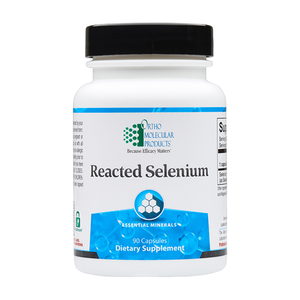
Reacted Selenium, 90 caps
DESCRIPTION
Reacted Selenium provides 200 mcg per serving of selenium, ideally formulated using the amino acid chelate form of selenium (selenium glycinate) for enhanced absorption, optimal utilization and gastrointestinal comfort.
- Boosts Antioxidant Reserve and Supports Inflammatory Balance
- Promotes Cardiovascular Health
- Supports Prostate Health
INGREDIENTS
Serving Size: 1 Capsule
Servings Per Container: 90
Ingredients: Selenium (as Selenium Glycinate Complex) 200 mcg
Other Ingredients: Natural Vegetable Capsules, Microcrystalline Cellulose, and Magnesium Stearate.
Does Not Contain: Formulated to be free of allergens derived from: Gluten, yeast, artificial colors and flavors.
DIRECTIONS
Suggested Use: 1 or more capsules per day or as recommended by your health care professional
Caution: If you are pregnant or nursing, consult your physician before taking this product.
Storage: Keep container tightly closed. Store at room temperature. Keep out of reach of children.
LEARN MORE
Selenium is a trace element and a constituent of more than 20 selenoproteins that play critical roles in supporting reproduction, thyroid hormone metabolism, DNA synthesis and antioxidant status. Selenium exists in two forms: inorganic (selenate and selenite) and organic (selenomethionine and selenocysteine). Most selenium found in human and animal tissues is in the organic form of selenomethionine, where it can be incorporated with amino acids. Skeletal muscle is the major site of selenium storage.
Selenium has structural roles, as well as enzymatic functions. It is best-known as an antioxidant and catalyst in the production of active thyroid hormone. Selenium is essential in the balance and support of immune system function. Selenium promotes sperm motility, maintains positive mood, antioxidant status, normal inflammatory balance, and heart health. In the context of potential health effects, low selenium status is cause for concern.
Statements contained herein have not been evaluated by the Food and Drug Administration. This product is not intended to diagnose, treat, cure, or prevent disease.






